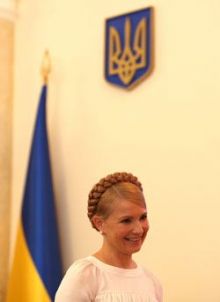The World Bank (WB) is eager to deepen cooperation with the government in order to stabilize the situation in the banking sphere. ”Our strategy in Ukraine provides for approximately a billion dollars a year. And we have asked for more resources to cover problems in the banking sector,” Martin Raiser, World Bank’s Country Director for Ukraine, Belarus and Moldova, stated at the meeting with Ukraine’s Prime Minister Yulia Tymoshenko. According to Raiser, it is important to maintain intensified dialogue not only to weather the crisis, but also to implement projects that will help strengthen and develop domestic economy as well.
In her turn, Tymoshenko said she hopes to work out as quickly as possible all the nuances, conditions, and procedures the country needs to receive financial aasistance. The prime minister also said that they have cooperated with the World Bank to develop Ukrzaliznytsia and road construction in Eastern Ukraine.
Since the beginning of its cooperation with the World Bank Ukraine has received five billion dollars of investments as well as contributions to the budget with a five-percent annual interest rate. Tymoshenko hopes that at this stage the money received will be used not only to implement reforms, but also to stabilize the banking system.
Ex-Speaker of the Verkhovna Rada Arsenii Yatseniuk has previously confirmed to The Day that Ukraine will receive finances to reform its financial and banking sector, including finacial capitalization of Ukrainian banks. ”We have received a clear signal from the World Bank that they are ready to reconsider the portfolio and provide resources to Ukraine. We are talking about nearly two billion dollars. These are serious resources. The ball is now in Ukraine’s court. And the amount of financial support we will receive depends on us,” he said.
Very little is known from the official sources about the details of the negotiating process between the World Bank and the government. The Ukrainian side wants to get a preferential credit with the annual interest rate under five percent. According to The Day‘s source in the World Bank who wished to remain unidentified, the main goal of the Tymoshenko-Raiser meeting was to discuss the essence of the new stage of enhanced cooperation and mechanisms of its implementation.
However, the World Bank has to convene the board of directors in order to give Ukraine financial support. This cannot be done until the draft of the enhanced cooperation program is ready. At the same time, the Kyiv office of the World Bank reported that the preparation of the so-called Development Policy Loan III has been stepped up. This loan is envisaged as funding provided to Ukraine’s state budget in support of the most important structural reforms. The list of the key reforms includes increases in utility fees, which will secure stability in this sector and a reduction of financial losses; enhanced transparency in the financial and corporate sectors, in particular thought the new law ”On Joint-Stock Companies” and a revision of the legislative framework for state purchases.
Furthermore, the World Bank has started working on the banking sector rehabilitation loan. Theoretically, it can inject money into the banking system, like the International Monetary Fund has done, but this kind of practice is not typical of the World Bank. Today its portfolio of programs does not include any projects to finance the real sector of Ukraine’s economy. The key programs are dedicated to the development of education, social security, healthcare, environmental safery, and assistance in issuing land title deeds to citizens.
Valerii Heiets, director of the Institute of Economics and Forecasting, believes that the World Bank is interested in funding specifically infrastructure projects. ”From this point of view it will be a positive thing, because projects like this never disappear — rather they are implemented and [their results] stay for many years,” he says. As for the use of the ”world” resource to satisfy the banks’ needs, Heiets thinks that ”the banks should work independently on international markets.” If the money goes to the banking sector, it will be appropriate to request that holdings of shares in private banks be transferred to the state. ”The state has two banks, but they have a mere 7-8 percent of the market. If we take out this loan [from the World Bank], we need, above all, to either capitalize the state-owned banks, thereby strengthening them, or use the money to the restructure private banks, but in this case we should transfer their capital to a state-owned bank, thus creating two or three powerful state banks,” Heiets said in an interview to The Day.







